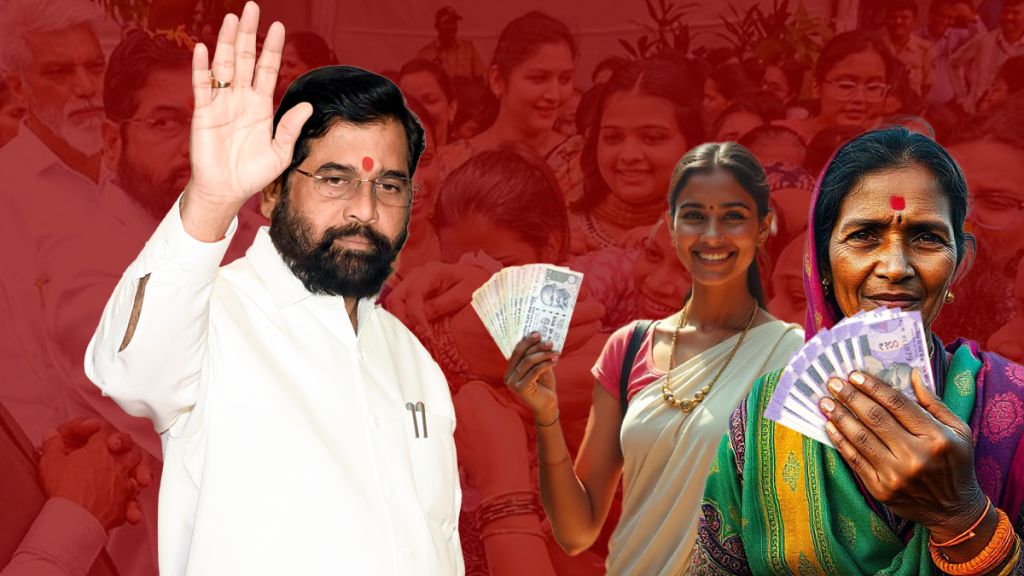
With the Maharashtra Assembly elections around the corner, political analysts are closely watching the effects of the ruling alliance’s Ladki Bahin Yojana, seen as a possible game-changer for the Mahayuti government, which includes Eknath Shinde’s Shiv Sena, the Bharatiya Janata Party (BJP), and Ajit Pawar’s faction of the Nationalist Congress Party (NCP).
While the scheme is viewed as a strategic move to win over women voters, recent defections from the ruling camp to the opposition suggest the political battle is not yet over and the voters might be signalling towards a change.
Launched by the ruling alliance, the Ladki Bahin Yojana aims to empower girls and women in Maharashtra, addressing a key demographic of voters. Before the scheme was paused due to the model code of conduct, the government had already transferred five instalments of ₹1,500 per month to 2.34 crore applicants. This amounted to a significant outlay of ₹17,174 crore, raising questions about the sustainability of such populist measures and their potential electoral impact in run up to the state elections.
Populist schemes: A proven strategy?
Populist schemes have long played a crucial role in Indian elections, from cash transfers and farm loan waivers to subsidised electricity and women-centric initiatives. In some cases, these schemes have significantly swayed voters, as seen in past elections across the country.
In Delhi in 2020, the Aam Aadmi Party (AAP) won a landslide victory by offering free electricity (up to 200 units), free water, bus rides for women, and improvements in government schools. These promises, particularly in education and women’s empowerment, resonated with lower- and middle-income voters, allowing AAP to secure 62 out of 70 seats.
In Telangana in 2018, the Telangana Rashtra Samithi (TRS) introduced the Rythu Bandhu scheme, which provided direct financial support to farmers. The scheme was credited for the party’s strong showing, winning 88 of 119 seats, and solidified TRS's base among rural voters.
In Tamil Nadu, the Dravida Munnetra Kazhagam (DMK) promised financial assistance for women, free bus rides for women, and support for farmers and low-income households ahead of the 2021 elections. The DMK won 159 of 234 seats, defeating the ruling AIADMK. The promise of a monthly stipend for homemakers played a key role in mobilising women voters, contributing to the DMK's success.
Shivraj Singh Chouhan-led government in Madhya Pradesh announced several populist schemes including the Ladli Behna Yojana targeting women aged 23-60 years from low-income families and providing them with Rs 1,250 per month ahead of the 2023 assembly elections. As a result, his government won the state with a thumping majority even after years of anti-incumbency much to the Congress’ disappointment.
Maharashtra’s complex political terrain
Despite the success of populist schemes in other states, Maharashtra presents a unique challenge. Over the past few years, the state’s political landscape has been marked by party splits, shifting alliances, and heightened political rivalries. The battle for power in the upcoming elections is not just about promises and schemes; it’s about the very survival of political entities and their leaders.
Political analysts believe that while the Ladki Bahin Yojana might appeal to women voters, it is difficult to predict whether it will guarantee electoral success in Maharashtra, where the political dynamics are far more fluid and unpredictable.
Lessons from failures of populist schemes
Not all populist schemes have translated into electoral victories. There are instances where parties have failed to win despite offering attractive welfare measures:
In Madhya Pradesh (2023), the Congress promised its Nyay Yojana and farm loan waivers, yet it struggled to win seats. Delayed implementation and doubts about the schemes' financial sustainability weakened their appeal, and local governance issues seemed to take precedence over populist promises.
In Tamil Nadu (2021), the AIADMK’s wide-ranging populist measures, such as Amma Canteens, free laptops, and financial support for women, failed to prevent the party’s defeat. Voter fatigue after 10 years of AIADMK rule, combined with the DMK’s more attractive welfare promises, played a significant role in the shift.
In West Bengal (2021), the BJP promised cash transfers, free rice, and farmer support under the PM-KISAN scheme, but these promises couldn’t outmatch Mamata Banerjee’s Trinamool Congress (TMC), which retained a strong voter base through its established welfare schemes like Kanyashree and Rupashree (for women’s education and marriage).
Why populist schemes sometimes fail
Several factors can undermine the effectiveness of populist schemes:
- Delayed or inconsistent implementation: If schemes are not implemented swiftly or face administrative hurdles, they may fail to gain the expected electoral support. For example, the Congress’s farm loan waiver in Madhya Pradesh was delayed, causing voter scepticism.
- Over-saturation of promises: In states like Tamil Nadu and West Bengal, where intense political competition leads to a flood of promises, voters may become desensitised. The novelty and appeal of populist schemes diminish when both ruling and opposition parties offer similar packages.
- Leadership and governance issues: Strong leadership often outweighs the appeal of populist schemes. In West Bengal, Mamata Banerjee’s established leadership and connection with local communities helped her retain power, while in Tamil Nadu, the AIADMK struggled with leadership challenges after J. Jayalalithaa's death.
Political turmoil and defections
Amid the Ladki Bahin Yojana’s potential to boost the ruling coalition’s chances, the exodus of leaders from the Mahayuti government raises concerns about its winnability. Several key leaders from Ajit Pawar’s NCP and BJP factions have defected to Sharad Pawar and Uddhav Thackeray’s camps citing dissatisfaction within the ruling alliance. More defections are expected as party members face uncertainty over ticket allocations for the upcoming elections, further complicating the ruling coalition’s prospects.
The Ladki Bahin Yojana might be seen as a masterstroke by the ruling coalition, but the defections and political unrest signal that the race for power in Maharashtra is far from over. Whether or not the scheme will help the Mahayuti government retain power is to be seen when results will be declared on the evening of November 23.